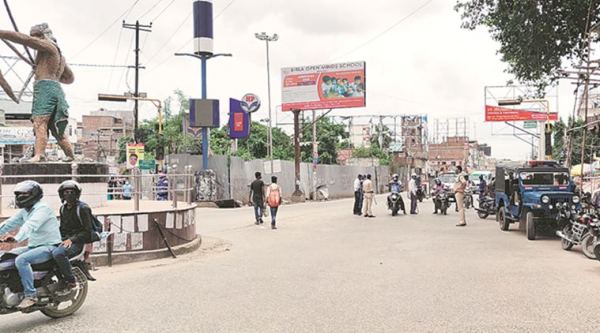 Bhagalpur has been under lockdown from July 9.
Bhagalpur has been under lockdown from July 9.
Many more people wear masks now, but there are many who don’t, right in front of police. The police seem to stop vehicles, mostly two-wheelers, on whimsy. Big cars are mostly let off. The police are wary, talking of the coronavirus, and how to slap fines safely. Most commuters carry a prescription in their pocket, which doubles up as a pass for movement.
Bhagalpur, the focus of a series by The Indian Express to understand Covid-19 and its impact, is witnessing a steep Covid curve. Till date it has recorded 2,023 Covid cases, up from 245 on June 8, and 19 deaths, second only to Patna in the state. Bihar is in lockdown for two weeks, from July 16 to 31, but Bhagalpur has been under lockdown from July 9. On July 18, The Indian Express spent time at four main intersections of Bhagalpur to look at the effects of the lockdown and its enforcement.
Tilka Manjhi Chowk: 11.40 am
Ten police personnel, including two traffic policemen, are standing on one side of the chowk, next to a police jeep, all wearing masks. The stream of traffic is steady, but not as heavy as usual. Cycle rickshaw-pullers and e-rickshaws abound. They are exempt from the lockdown. Some policemen stand in the middle of the road, looking to stop vehicles. Half an hour passes, no car is pulled aside, except for a Maruti Omni school van. Motorcycles are stopped often, but mostly on a whim. Many motorcyclists whip out doctors’ prescriptions.
K K Sharma, the inspector in charge, argues with one: “This is a prescription from January last year. You are trying to fool us. Fine him.” He waves the motorcyclist over to Mahendra Kumar Mishra, who is handing out challans, and fines him for not wearing a mask. Mishra has a black bag, inside which is a pair of gloves.
All shops except essential services are meant to be shut. But tea shops and paan stalls are open, in full view of the policemen. The ratio of people wearing masks has increased, but many wear it around their necks, pulling it up when they see the police.
Across the road from the police van is a row of cobblers. Three of them are not wearing masks, as are four rickshaw pullers next to them. One police constable says, “We have been asked not to be harsh on the poor.”
Kachari Chowk: 12.15 pm
There are eight policemen, but the nervousness is palpable. Behind them is the district magistrate’s office, where there have been several positive cases including the district magistrate, the ADM who took his place, and other senior officials. The parking lot is empty, barring two motorcycles. A policeman is collecting fines. He has two booklets, one saying Covid Niyantran Raseed (Covid Control Receipt) issued by the Health Department, and the other for challans under the Motor Vehicles Act. The former, ironically for a lockdown, says at the bottom “Mask pahaniye, kaam pe chaliye”.
Only one Rs 50 fine has been issued since morning. The police are more preoccupied with where they are standing, and the risks involved. They seem relieved as a Bihar Fire Services truck arrives and hoses the place with sanitiser. A little later, Traffic SP R K Jha arrives on a round in his Gypsy. He tells his personnel, “Don’t take fines directly like this. Ask them to deposit it in the bag. Lockdown won’t protect us, we have to protect ourselves.”
Ghantaghar Chowk: 12.35 pm
One of the city’s landmarks, the chowk has a temple, in front of which five policemen and one policewoman are sitting on chairs. There is traffic in front of them — cars, bikes, pedestrians without masks, but no checking takes place.
The chowk is known for its row of fruit and coconut water stalls. Under the lockdown rules, they are allowed to function from 6 am to 10 am, and from 4 pm to 7 pm. So at this time in the afternoon, tarpaulin sheets are drawn over them. But that doesn’t stop customers from stopping and buying produce.
The owner of a stall, unfortunately placed next to a seated policemen, complains that a seller on the far end is doing brisk business. The policeman snaps, “Toh main kya karu?” Then he reluctantly goes and asks him to stop his sales. As he returns to the chair, the sales resume.
There are 19 fruit sellers on the roadside where the policemen sit. Six of them have masks.
Variety Chowk: 1.15 pm
Variety Chowk is in the middle of a usually busy marketplace, with tiny lanes. Shop shutters are all down, barring at medicine stores. One shopkeeper sitting in front of his electronic appliances store says, “I know Covid is dangerous, but how much of this can we survive?”
There are six rickshaw pullers, three without masks, all without customers, two asleep. In front of the shuttered stores, there are a few mango sellers. More sell an assortment of fruit. One woman, without a mask, sells makhana.
Three people have strung up masks to sell. Ankit Kumar is one. He has been doing this for two months. Earlier, he sold paan. “In this lockdown, even masks are not selling. Earlier I would sell 50 a day. Now only 15. This place used to be packed every day, but not any more,” he says.
Less than two hundred metres away, under Lohia bridge, there is a crowd of people brushing past each other, buying items off the street. There are vegetable sellers, stalls selling wooden baskets, and slippers. One seller says, “If they remove us, we will go. But till then, we will have to earn our daily bread.”